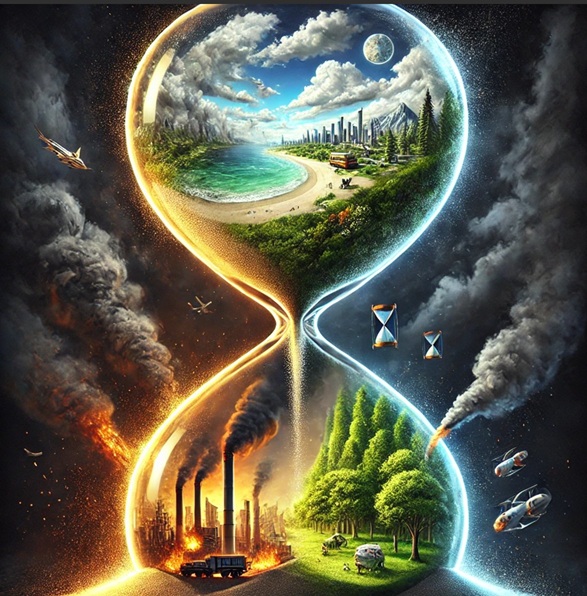Watching History Repeat Itself…
How the west was won!
President Dwight D. Eisenhower: Being born when Eisenhower and Stevenson were facing off, Truman was still sitting at the resolute desk, and the war was but a few years behind us; what was the 1952 campaign all about? Although he swore to never be involved in politics, Eisenhower somehow became convinced to run. Why?
“The stalemated war in Korea, corruption in the Truman administration, and Communist subversion were the issues that Republicans emphasized throughout the campaign. Eisenhower held a clear lead over Stevenson in the polls, as voters looked to Eisenhower to clean up what even Stevenson had called “the mess in Washington.”” UVA | Miller Center
What and interesting terminology, “the mess in Washington.” It somewhat smacks of “Cleaning out the swamp,” does it not? “Corruption, subversion, political in-fighting, nonpartisanship, fear, turmoil.
But, things got better! Or did they?
President John F. Kennedy: In 1960, Senator John F. Kennedy was nominated as the democratic candidate, running against Richard M. Nixon. Again, according to history:
“Kennedy cast himself as a Cold War liberal and promised to lead America out of what he called the “conservative rut” into which he accused Eisenhower, and by implication Nixon, of running the country. … On Election Day, November 8, Kennedy won the popular vote by less than 120,000 votes out of a record 68.8 million ballots cast. Kennedy won the electoral college vote more clearly, winning 303 votes to Nixon’s 219 (with Virginia’s Harry F. Byrd winning 15). The closeness of the election naturally fueled speculation of tampering on both sides.” UVA | Miller Center
President Lyndon B. Johnson served from 1963 – 1969, a good, long time to do something efficacious. Perhaps the next American President who could “clean out the swamp?” History records this (all of these years I recall all too clearly):
“During the Johnson years, the nation experienced “long hot summers” of racial and campus unrest. There were riots in Harlem, New York, in 1964 and in the Watts district of Los Angeles in 1965, both fueled by accusations of police brutality against minority residents. In Cleveland, Detroit, and Newark, in 1967, whole city districts went up in flames. In April 1968, Washington, D.C., erupted in the aftermath of the assassination of Dr. Martin Luther King. “Burn, baby burn” became a slogan of the protesters. In many cities, National Guardsmen or federal troops had to restore control.
In his State of the Union Address of 1968, Johnson observed that “there is in the land a certain restlessness–a questioning.” That was, perhaps, the understatement of his presidency.” UVA | Miller Center
Do you see any reason so far, why I should not have a vote of no confidence in the American Political System, or understand why I retired politically? If not, please keep reading.
President Richard M. Nixon: (1968)
“At the Republican Party convention, Nixon won the nomination on the first ballot. Reagan moved to make the nomination unanimous. The presidential hopeful then tapped Maryland’s governor Spiro Agnew as his running mate. In his acceptance speech, Nixon offered hope to a country in chaos: “We extend the hand of friendship to all people. To the Soviet people. To the Chinese people. To all the people of the world. And we work toward the goal of an open world, open sky, open cities, open hearts, open minds.” Outside the convention hall, Chicago police clashed with demonstrators, igniting riots.”
“Nixon’s downfall, however, came not so much from lack of congressional support—though that was the proximate cause—as it did from what is undoubtedly history’s most transparent look into of the presidency of the United States. Nixon’s secret White House tapes, uncovered in the course of the Senate Watergate hearings, revealed the truth about the Nixon presidency—and about Nixon himself. As much as Americans may have wanted to believe the president when he told them that he wasn’t involved in the Watergate cover-up, the tapes proved otherwise. Americans could not reconcile Nixon’s public statements with the private recordings, and many could reach only one conclusion: Their president had lied to them.” UVA | Miller Center
Then Along Came Jones… (Ray Stevens)
President Gerald Ford: On September 8, 1974, granted a “full, free, and absolute pardon” to former President Richard Nixon. (To the rescue.)
When Ford took the oath of office just a month earlier, he took over the presidency from an embattled Richard Nixon, who had just resigned as the 37th President of the United States due to the myriad of political and legal problems surrounding his involvement in the Watergate scandal. Ford spoke to the nation on August 9, engaging in “a little straight talk among friends,” and acknowledged the special circumstances of the occasion. Addressing the Watergate scandal directly, he declared that “our long national nightmare is over.”
Instead of bringing the nation together, however, the pardon reignited the firestorm surrounding Nixon. Ford’s approval ratings dropped dramatically, and he would later admit that the pardon was his most difficult domestic decision. Nevertheless, the use of the pardon to forestall the prosecution of an unindicted, private citizen enhanced those powers delegated to the President under Article II, Section 2 of the U.S. Constitution and reaffirmed the use of the presidential pardon, extending its reach beyond both legal and congressional challenge. UAV | Miller Center
So, then, now we are into the MID-70s. Are any “great changes” being made?
President Jimmy Carter: Beauty is in the eye of the beholder!
“Jimmy Carter’s one-term presidency is remembered for the events that overwhelmed it—inflation, energy crisis, war in Afghanistan, and hostages in Iran. After one term in office, voters strongly rejected Jimmy Carter’s honest but gloomy outlook in favor of Ronald Reagan’s telegenic optimism.”
“Carter subtly tried to pin Ford to the failures and disgrace of the Nixon administration. He called for “a government that is as honest and decent and fair and competent and truthful and idealistic as are the American people.” As with most campaigns, both candidates sought to define the other as something the voters didn’t want. Carter painted Ford as an extension of Nixon. Ford portrayed Carter as an inexperienced liberal who would create new government programs paid for by tax increases.” UVA | Miller Center
As King Solomon aptly put it: “There is nothing new under the sun.”
President Ronald Reagan: (1981-1989) According to historical accounts, the Actor From Hollywood proved himself to be one of the most competent serving officials ever elected.
“Carter had been in 1976 … In the eyes of many Americans, Carter had promised much but delivered little and was to blame for the economic calamities that had befallen the nation. Reagan also had an optimistic temperament. Carter, in contrast, was defensive and stopped holding White House press conferences because of the critical nature of the questions.
He (Reagan) wound up the debate with an effective iteration of his basic campaign theme asking Americans to make their decision on the basis of the Carter administration’s record: “Are you better off than you were four years ago? Is it easier for you to go and buy things in the stores than it was four years ago? Is there more or less unemployment in the country than there was four years ago? Is America as respected throughout the world as it was?” For voters who answered “no” to these questions, Reagan was the clear alternative.
Traditional Republican support among white Protestants, small-town and rural Americans, college graduates, upper-class Americans, and white-collar managers and professionals remained exceedingly strong. Catholics who had supported Reagan in 1980 voted for him again in 1984, as did a large number of skilled and unskilled workers, high school graduates, and persons of moderate incomes.”
“The Reagan-Bush ticket won an overwhelming victory on election day, carrying every state but Mondale’s Minnesota and the District of Columbia, and defeating Mondale in the Electoral College by 525 to 13. Reagan’s popular vote total was even more impressive—54 million votes to Mondale’s 37 million—a margin exceeded only by Nixon’s win over George McGovern in 1972.”
President G. H. W. Bush: (1989 – 1993) Every politician has a fan base, someone who will tout the individual’s strong points. For every one of these, however, is the not so favorable view of candidate.
“Because George Bush was refused a second term by American voters, any re-evaluation of his presidency by historians will always have a low ceiling. But the tumultuous political history of this nation since he left office has only accentuated for us the virtues of a president who was bold and prudent in using the nation’s military might, and one who accepted the political heat for dealing seriously with an imbalance between the nation’s taxes and spending. That’s a legacy worth remembering. Russell Riley—Opinion contributor
In his acceptance speech at the convention, Bush stressed the successes of the Reagan years and his ability to continue to build on them. He pledged to round out some of the harsher edges of the previous administration, stating that he wanted “a kinder and gentler nation.” And famously, he promised not to raise taxes: “Read my lips: no new taxes.”
It was, however, the promises he made, and the reneging on them, as well as the controversial results of his diplomatic efforts that cost him re-election.
The 1992 presidential campaign focused primarily on domestic issues, specifically the economy … As the economy slowed down, Bush did not enact any major legislation that might have proved to the voters that he was responding to their concerns. The President was also damaged by charges that his domestic policy lacked vision, and he gained little among the electorate by pointing to his foreign policy accomplishments. — Bush left the White House somewhat embittered, convinced that the media had slanted its coverage in favor of his opponent in the 1992 election. UVA | Miller Center
Recent enough history to recall the others…

President Bill Clinton: The Monika affair and impeachment.
President G.W. Bush: Ended his term with very low job approval ratings and resulted in the Republicans losing control of Congress, and the loss of the 2006 elections. UVA|Miller Center
President Barack Obama: Left office in 2017 with, essentially, a vote of no-confidence, leaving Congress in the control of the Republicans with little hope of his successor, Hillary Clinton, keeping the White House.
President Donald J. Trump: Essentially an elected criminal, cried like a baby when he lost, insighted insurrection, and without doubt the most odious, calamitous, arrogant, and disingenuous politician to ever hold office, and yet, here he is, still in the forefront of politics.
President Joseph R. Biden: Finally, but not last, due to age, mental incapacity, and failing health, not to mention and overall poor performance in stabilizing the economy, was asked to step aside while running for re-election.
These are the administrations that personally, I have lived through.
I write that to ask this: What are we learning from it?
This is written for those who allow themselves to be divided by bloviating and twisted politicians who seem to be growing more prevalent as this nation’s moral values continue to decline.
Chasing your tail, pursuing a dream at the end of a pseudo-political rainbow—the politicians neither the root of the problem, nor will they be the solution! It is we, the people, who are supposed to form a “more perfect” union, establish justice… and so on. Not the politicians, and that’s just not happening, is it?
In fact – TWO HUNDRED AND FORTY-EIGHT years after the founding of this nation, just about the length of time it took the Roman, Greek, and other empires to collapse, and this country remains no closer to “liberty and justice for all,” than it ever has.
Like those great nations before this one, it is the people, their society, that brought about their collapse. American society is like a 300-pound diabetic who, after years of self-abuse and gluttony, comes to the hospital angry at doctors and nurses for not being able to cure them. We must face the fact: we have met the enemy, and they are us.
I cast a vote of no confidence!
As of October 26, 2024, the population of the United States is 346,017,763. The U.S. makes up roughly 5% of the world’s population (8.2 Billion People) yet it consumes 25% of the world’s resources. Thus, it is our own avarice and selfish desires that consume our society, and no politician is going to change that.
Share This Story:
Leave A Comment
You must be logged in to post a comment.
Related Articles
News & Information, Other Writing, Polit_Tics













James Eichenlaub says: